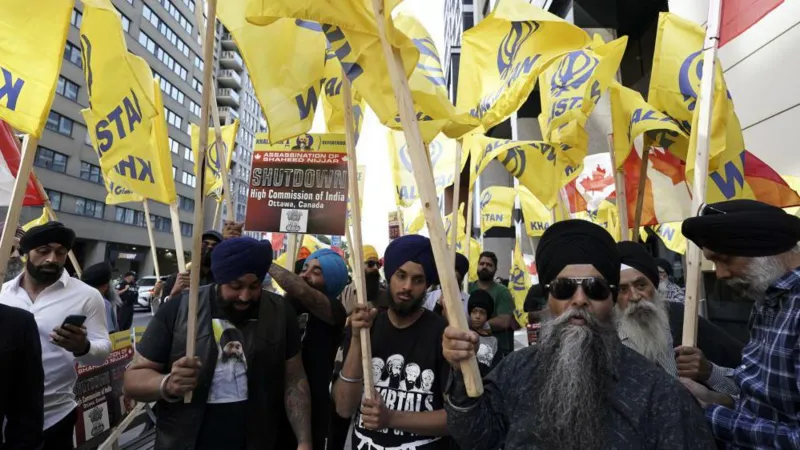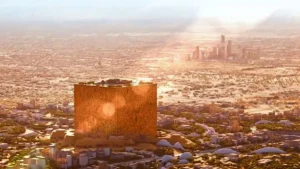The death of a Sikh separatist on Canadian land has escalated tensions between India and Canada, leading to the expulsion of their top diplomats, a new low in their traditionally friendly relationship. Although there have been tense arguments in the past, none have escalated to this degree of direct conflict.
Canada was incensed when India surprised the world in 1974 by detonating a nuclear bomb, accusing India of stealing plutonium from a Canadian reactor—a gift meant only for peaceful purposes.
The two countries’ relations significantly cooled, and Canada stopped funding India’s atomic energy initiative.

However, as the dispute grew over the murder of Hardeep Singh Nijjar, a Sikh leader from Canada whom India had designated a terrorist, neither country expelled its top diplomats as it did on Monday.
Following PM Justin Trudeau’s assertion that Canadian police were looking into claims of Indian agents’ and the Indian government’s direct participation in the June 2023 killing, tit-for-tat expulsions took place.
Indian agents were also charged by Canadian police with participating in “homicides, extortion, and violent acts” against pro-Khalistan supporters who favor the creation of a separate Sikh nation in India. The accusations were dismissed as “preposterous” by Delhi.
The greatest Sikh diaspora outside of the Indian state of Punjab is found in Canada, where there are about 770,000 Sikhs. Relations between the two nations are still strained by Sikh separatism, which has its roots in a violent rebellion that took place in India in the 1980s and early 1990s. Delhi has harshly criticized Canada for not doing more to stop the pro-Khalistan agitation inside its borders. Canada claims that India has been keeping an eye on local Khalistani groups for many years.

According to Michael Kugelman of the American think tank Wilson Center, “this relationship has been on a downward trajectory for several years, but it’s now hit rock bottom,” he told the BBC.
“Publicly outlining grave and specific accusations, removing ambassadors and senior diplomats, and issuing diplomatic statements that use harsh language.” Even for their tumultuous relationship, this is new ground.
This time marks a historic change, according to several commentators.
According to Ryan Touhey, author of Conflicting Visions: Canada and India in the Cold War World, “this represents a significant slide in Canada-India relations under the Trudeau government.”
Mr. Touhey, a history professor at St. Jerome’s University in Waterloo, says that one of the main achievements of the previous prime minister Stephen Harper’s administration was encouraging a “long period of rapprochement” between Canada and India, putting aside issues with nuclear proliferation and Khalistan.
Instead, given the sizeable Indian diaspora in Canada, emphasis was placed on the value of people-to-people connections as well as trade and educational relationships. It’s also important to remember that since the year 2000, the Khalistan issue has essentially vanished. It has now abruptly erupted once more.

However, Canadian security agencies did not accuse Harper of any connection between the murder of a Canadian citizen and Indian government agents.
According to Canadian police on Monday, they have contacted at least a dozen individuals in recent months, particularly those involved in the pro-Khalistan movement, since they feel they are in danger.
They claimed that further inquiries revealed “a significant amount of information about the breadth and depth of criminal activity orchestrated” by Indian operatives, along with the resulting dangers to Canadians.
“No country, particularly not a democracy that upholds the rule of law, can accept this fundamental violation of its sovereignty,” Trudeau stated.
With elections just a year away, Trudeau seems to be fighting domestic anti-incumbency at the moment of Canada’s accusations. According to a recent Ipsos poll, only 28% of respondents believe Trudeau should be re-elected, and only 26% said they would support the Liberals. Canada’s accusations were attributed by India’s foreign ministry to the “political agenda of the Trudeau government that is centred around vote bank politics” in harsh remarks made on Monday.
In 2016, Trudeau claimed to have four more Sikhs in his cabinet than Indian Prime Minister Narendra Modi. Despite making up only over 2% of the population, Sikhs hold 15 seats in the House of Commons, or over 4% of the total, giving them significant political clout in Canada. Many of these seats are located in strategic areas of conflict during national
In general, this issue will convey the impression that the prime minister is bouncing from one disaster to another, in my opinion. In particular, it might damage the Indo-Canadian community more than before, Mr. Touhey argues.
Once primarily Punjabi and Sikh, he explains, the Indian diaspora in Canada has expanded in diversity to include a sizable Hindu population as well as immigrants from southern India and the western state of Gujarat.
“They would not be sympathetic to Sikh separatism since they are proud of India’s economic progress since the 1990s. In the past, particularly in British Columbia, the Liberals have had considerable political success with the Sikh vote.
But Mr. Touhey doesn’t believe that the Indian situation is related to

“After decades of begging Canadian governments to take Indian concerns about pro-Khalistani elements in Canada seriously, they feel like they’re back to square one,” Mr. Touhey says. “But this time, you have a much different government in Delhi that is willing to act forcefully, right or wrong, to rein in perceived domestic threats.”
Mr. Kugelman agrees with this statement.
“A number of factors contribute to the swift decline in bilateral relations. This involves a basic misalignment: Canada sees what India perceives as a grave threat as merely free speech-protected action and criticism. Additionally, neither is prepared to compromise,” he claims.
It might not be all gone. The two nations have a lengthy
“On the one hand, the relationship is far more broad-based than ever thanks to the size of the diaspora, the diversity of that diaspora, and the increase in bilateral trade, increased student exchanges—albeit this last point has become a problematic issue for the Trudeau government as well,” says Touhey.
Therefore, I believe that interpersonal connections will work out. The current Canadian administration is essentially entering its last year, with an election scheduled until at least the fall of 2025, so I don’t think there is much it can accomplish at the high bilateral level.”
However, analysts warn that things currently appear to be in a really poor state.
Delhi now accuses Canada of the same things it has frequently accused Pakistan of. It


